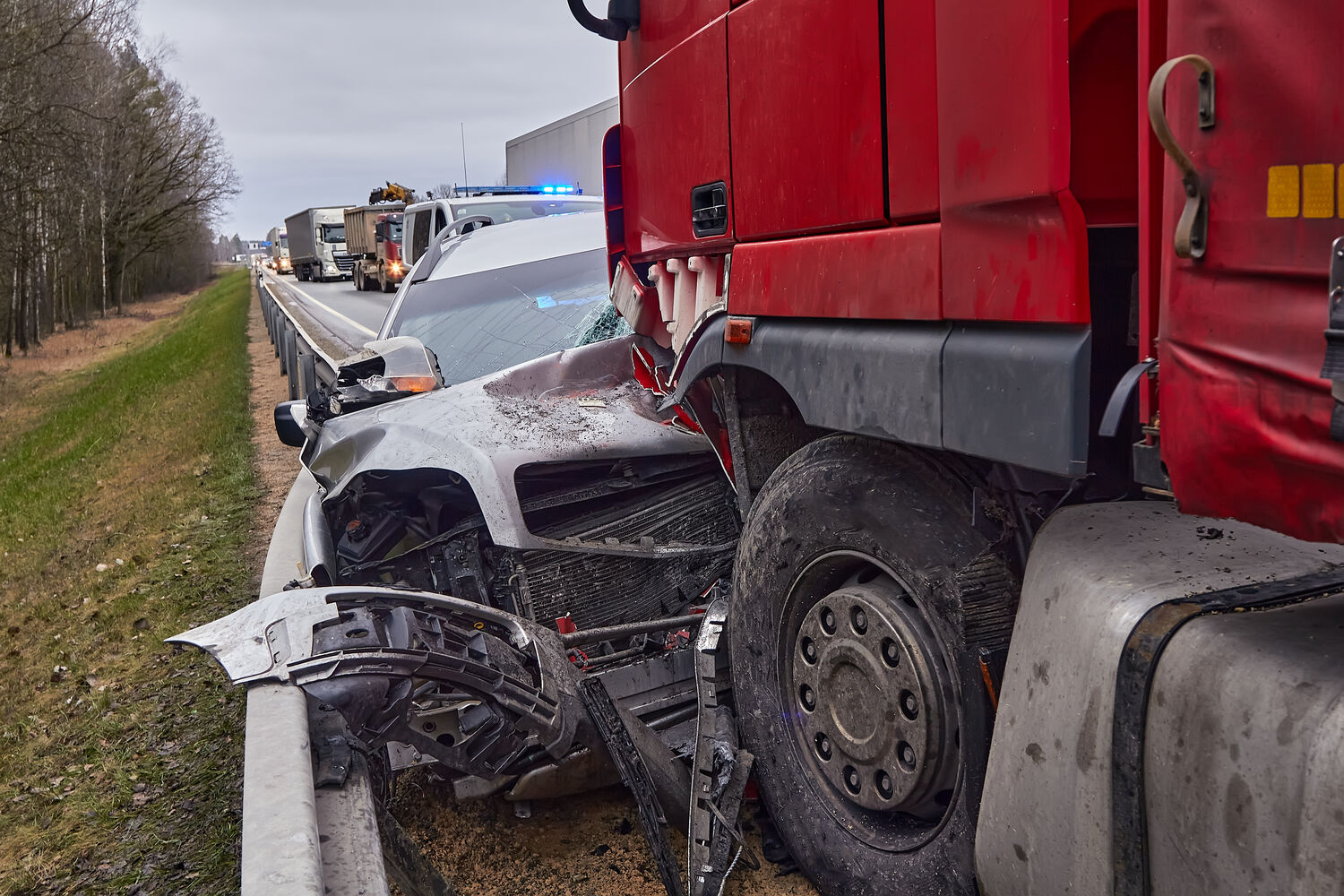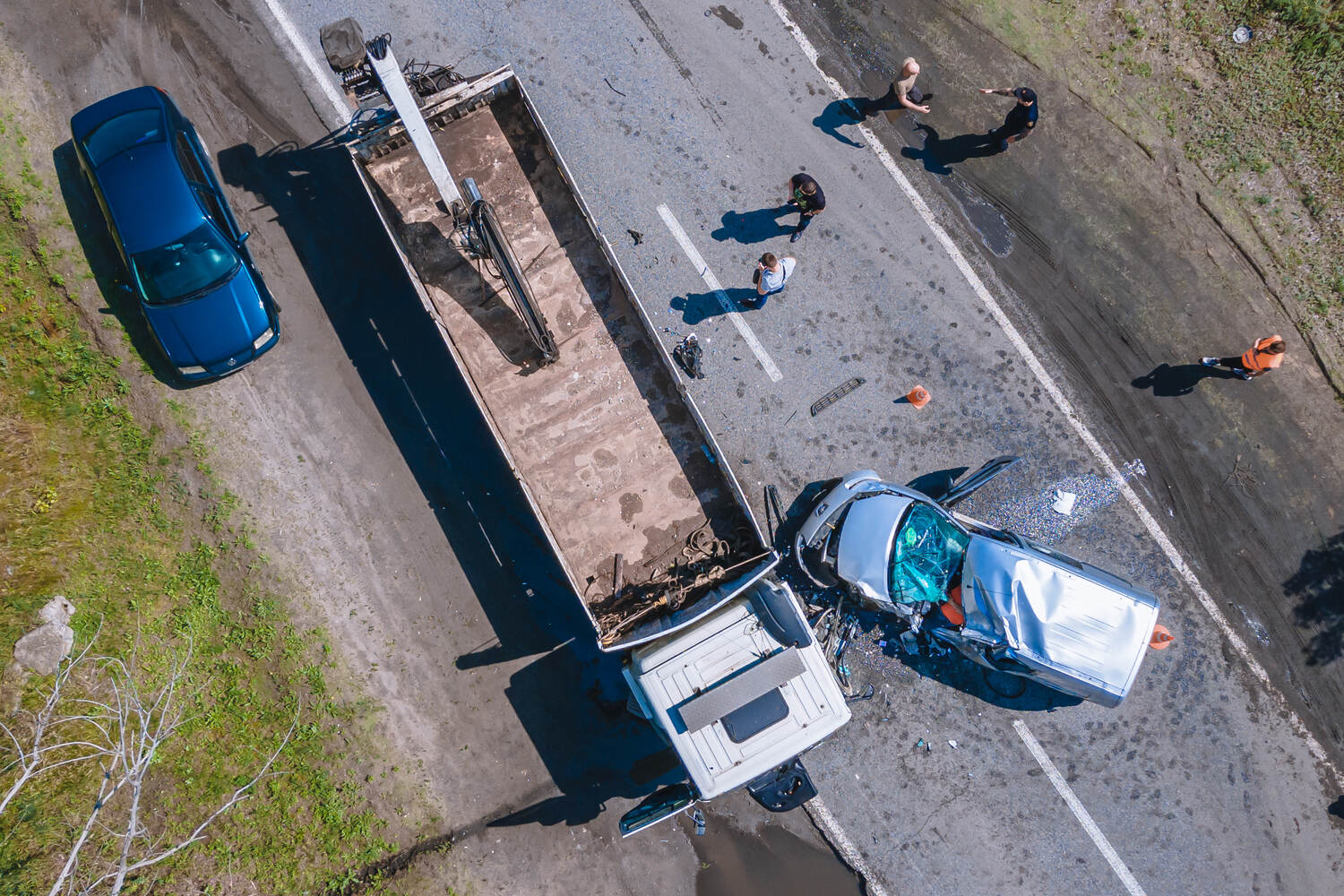RECENT POSTS
Categories
Who is Liable in a Truck Accident? [Liability Breakdown]
Truck accidents often cause severe injuries, costly medical bills, and long-term consequences for everyone involved. Understandably, determining who is responsible for a truck accident is often a complex process involving large transportation companies, equipment manufacturers, and sometimes government organizations. Due to the complexity of these claims, it is important to understand the process of assigning liability so you can properly pursue the compensation you deserve.
If you have been injured in a truck accident, it is crucial to document everything and to contact an experienced truck accident attorney. Doing this quickly will ensure all evidence is secured and increase your odds of receiving proper compensation.
Common Injuries Caused by Truck Accidents
Truck accidents can lead to life-threatening injuries. Although this section isn’t the focus of our post, it's essential to quickly address some of the common injuries resulting from these accidents. These include:
- Traumatic Brain Injuries (TBI): Caused by head impacts, TBIs can range from concussions to severe brain damage.
- Spinal Cord Injuries: Injuries to the spine can cause partial or complete paralysis.
- Broken Bones: Fractures in the legs, arms, or ribs are common in truck accidents due to the force of impact.
- Internal Injuries: Damage to organs like the liver, spleen, or kidneys often requires urgent medical attention.
- Whiplash: A neck injury caused by the sudden jerking motion during a collision, often leading to chronic pain.
These injuries can have long-lasting effects, and understanding who is liable is critical for recovering the necessary compensation for medical care, rehabilitation, and lost wages.

Responsible Parties in Truck Accidents
Determining who is responsible for a truck accident involves considering several parties. In many cases, multiple parties can be held accountable, including:
1. The Truck Driver
The truck driver is often the first party considered in determining liability. Negligence on the part of the driver can include things like:
- Distracted driving (texting, eating, using a phone)
- Driving under the influence of drugs or alcohol
- Fatigue (truckers are often on tight schedules, leading to drowsy driving)
- Reckless driving or speeding
If the driver was at fault due to any of these actions, they may be held responsible for the accident.
2. The Trucking Company
The trucking company can also be held responsible under the legal doctrine of vicarious liability, which holds employers accountable for the actions of their employees while they are on the job. If the truck driver was acting within the scope of their employment (for example, making a delivery), the company can be held responsible.
Additionally, if the trucking company was negligent in maintaining their vehicles or failed to properly train drivers, they may share liability for the accident.
3. Truck Manufacturer or Parts Manufacturer
If the accident was caused by a defect in the truck or its parts, such as faulty brakes, a tire blowout, or issues with the truck's transmission, the manufacturer may be held liable. Product liability law allows injured parties to sue the manufacturer for damages caused by defects in design, manufacturing, or lack of proper warnings.
4. Cargo Loaders or Shippers
If the cargo was improperly loaded, leading to an unbalanced load that caused an accident, the company responsible for loading the truck may be liable. Overloading a truck or improper securing of cargo can significantly increase the risk of accidents, such as rollovers or jackknife crashes.
5. Maintenance and Service Companies
Sometimes accidents are caused by poor maintenance or failure to address mechanical issues. If the trucking company hires a third-party vendor for truck maintenance or servicing, and the vendor’s negligence led to an accident, they may be held partially responsible.
6. Government Entities (Road Maintenance)
If a truck accident is caused by poor road conditions, such as potholes, poorly marked intersections, or malfunctioning traffic signals, a government entity responsible for maintaining the roads could be liable. Cases like this are complex and may involve issues related to sovereign immunity, but it’s possible to hold government entities accountable for road conditions that contribute to accidents.
7. Other Drivers
While trucks are often the most significant vehicles involved in accidents, sometimes other drivers can be partially at fault. If another driver’s actions contributed to the crash (e.g., cutting off a truck, failing to yield, or driving aggressively), they may share liability.
How is Liability Determined in Truck Accidents?
Assigning liability in a truck accident is a multifaceted process. Several factors need to be considered, including evidence, eyewitness accounts, police reports, and the actions of all parties involved. Here’s a closer look at how liability is typically determined:
Investigating the Accident
The first step in determining liability is to investigate the cause of the accident. This typically involves:
- Reviewing the accident scene for skid marks, debris, and damage to the vehicles.
- Examining police reports and any citations issued to the truck driver.
- Interviewing witnesses to determine if other drivers, pedestrians, or even road conditions contributed to the crash.
- Evaluating the vehicles’s maintenance history to see if mechanical failure played a role.
Determining the Truck Driver’s Role
If the trucking company’s actions contributed to the accident, they could be held liable under the concept of vicarious liability. This includes:
- Improper maintenance of the truck
- Failure to ensure driver compliance with federal regulations
- Hiring unqualified or unsafe drivers
If the transportation company failed to ensure the truck was in safe operating condition or failed to monitor the driver's hours of service, they may bear some responsibility for the accident.
Assessing Liability for Mechanical Failures
If a mechanical issue caused the accident, a manufacturer or parts supplier may be responsible. This involves investigating:
- The design of the truck or its parts (e.g., a known flaw in braking systems)
- The manufacturing process (e.g., improper assembly of critical components)
- The failure of maintenance or repair procedures (e.g., faulty parts installed by a third-party service provider)
If a defect or mechanical failure caused the accident, manufacturers or service providers could face significant liability.
Analyzing Contributing Factors from Other Drivers or Road Conditions
In cases where other drivers or road conditions contributed to the crash, these factors must be analyzed. For instance:
- Other drivers may be at fault if they cut off the truck, caused a collision, or merged improperly.
Road conditions can sometimes lead to accidents, especially if they are poorly maintained, with issues like potholes, uneven surfaces, or insufficient signage.

Available Compensation for Truck Accidents
If you’ve been injured in a commercial vehicle accident, you may be entitled to compensation for a variety of damages, including:
- Medical bills: All costs associated with treating your injuries, including hospital stays, surgeries, and rehabilitation.
- Lost wages: Compensation for income lost due to the accident, including future lost earnings if your injury prevents you from returning to work.
- Pain and suffering: Compensation for the physical and emotional distress caused by the accident.
- Property damage: If your vehicle was damaged or totaled, you may receive compensation for repairs or replacement.
- Permanent disability: If the accident resulted in long-term or permanent disabilities, you may be entitled to compensation for the ongoing care you will need.
Factors considered when calculating compensation include the severity of your injuries, the degree of negligence by each party, the costs of medical treatment, and the impact on your life.
Accidents Involving Multiple Responsible Parties
In some cases, more than one party may share responsibility for a truck accident. For example, a truck driver could be speeding while the truck’s brakes fail due to faulty maintenance. In such cases, multiple parties (the driver, trucking company, and service provider) may share liability. This can complicate the claims process, but a skilled truck accident attorney can help you navigate these complexities and ensure you receive the compensation you deserve.
How a Truck Accident Attorney Can Help
If you’ve been involved in a truck accident, navigating the complex process of determining liability and securing fair compensation can be overwhelming. That’s where Wettermark Keith’s experienced truck accident attorneys come in. Our team will thoroughly investigate the accident, gather crucial evidence, and interview witnesses to build a strong case on your behalf. We’ll identify all potentially responsible parties, whether it’s the truck driver, the trucking company, or even a manufacturer responsible for a faulty part. We’ll make sure each party is held accountable for their role in the accident.
If you want to build a strong case and receive proper compensation for your injuries, It’s important to reach out to a truck accident attorney as soon as possible. Our team at Wettermark Keith is available 24/7 so you can take the first step to protecting your rights and advocating for your best interests.
Contact us today for a free consultation. Let us help you navigate the legal process and fight for the justice you deserve.
Ready to work together? Contact us today for a free consultation.
HERE'S WHAT TO DO NEXT
If you or a loved one have been injured and think you might have a case, call us now for a free consultation.


